 |
|||||||||||||||
|
|||||||||||||||
 |
||
|
 |
||||||||||||
|
||||||||||||
 |
|||||||||||||||||||||||||||||||||||||||
|
|||||||||||||||||||||||||||||||||||||||
|

The Life of Pope John Paul:
Shepherd of Souls or
Antiquated Authoritarian?
By Tim Graham,
Director of Media Analysis
April 14, 2005
Page 1 of 2
|
Introduction
Coverage of churches is almost inherently difficult terrain for the titans of journalism, so committed to the worldly business of identifying the new, the trendy, the fresh and the fashionable. Age-enduring creeds aren’t newsworthy unless they can be reinvented with a modernist twist, like DaVinci Code tales of Jesus Christ having a wife and kids. Ancient traditions are especially galling if they stand in the way of lifestyles of modern convenience, of quickly consumable luxury goods or quickly consumable sexual relationships. American Catholics don’t expect reporters to genuflect and give their church and their Pope glowingly positive coverage. Like other consumers of America’s news media, religious people of all creeds should expect the media to offer solid explanatory journalism that covers both sides of newsworthy debates within the Catholic Church and other churches, but that’s not always what they receive. Too often, the slanted soundbite collections and loaded prose of reporters betrays that they want to make every institution in society agreeable to their liberal worldview, that there’s not one conservative policy or tradition in the world that isn’t in dire need of the media’s advice and intervention and overturning. In stories on the pontificate of John Paul II, reporters often chose sides in what one called the battle between “tolerance and absolutism.” In their passion for that fight, “tolerance” gained the majority of the time, and “absolutism” received the majority of the grief.
I. The “Communist Pope”? During his life and after his death, reporters and pundits alike acknowledged Pope John Paul’s political triumph in opposing Soviet communism. But over the years, several liberal media accounts portrayed Pope John Paul as comparable to (or even inferior to) a communist dictator during his reign at the Vatican. They failed to note any differences between church powers and state powers.
■ During the next day’s Good Morning America, ABC correspondent Steve Fox noted the similarity of the two men: “The Pope is a tough disciplinarian. He will brook no dissent on doctrinal matters....And if you think about Mr. Gorbachev, he, early in his career, was the head of the KGB [sic].” CBS correspondent Barry Petersen continued this line of thought: “I think [Gorbachev’s] trying to say to the Pope, listen, communism and Catholicism, we really have a lot in common. Kind of an astonishing thought if you think about it.” A lot of freedom-loving Catholics begged to differ. ■ The comparisons to communism erupted again in 1991, when in early June, the Pope visited Poland for the fourth time. Instead of delivering an even-handed account of the new tensions in post-communist Poland, CBS reporter Bert Quint ended his June 1 Evening News report by suggesting the new society in some respects was inferior to the old: “But most of his fellow countrymen do not share John Paul’s concept of morality....Many here expect John Paul to use his authority to support Church efforts to ban abortion, perhaps the country’s principal means of birth control. And this, they say, could deprive them of a freedom of choice the communists never tried to take away from them.”
While Quint’s stories on the papal visit featured soundbites from average Poles who supported his left-wing viewpoint, his three stories included no one who was inspired by the Pope’s visit or who opposed abortion. When asked by the MRC why viewers heard only one side of the story, Quint declared: “We are not an opinion-sampling organization. When we went out and interviewed people at random, [most] made comments like the one we put on the air.” A “random” sampling of the hundreds of thousands who attended the Pope’s rallies could have shown just the opposite. So who was more “intolerant of dissent”?
Keller’s Catholic Kremlin Even in 2002, long after Soviet communism crumbled, liberal journalists were still making unfavorable comparisons of the Pope to communist dictatorships. In a May 4, 2002 column in The New York Times, staff columnist Bill Keller – currently overseeing all the news pages as the paper’s Executive Editor – compared the Vatican to the Kremlin. “One paradox of the Polish Pope is that while he is rightly revered for helping bring down the godless communists, he has replicated something very like the old Communist Party in his church...Karol Wojtyla has shaped a hierarchy that is intolerant of dissent, unaccountable to its members, secretive in the extreme and willfully clueless about how people live.” He added: “Like the Communist Party circa Leonid Brezhnev, the Vatican exists first and foremost to preserve its power.”
Keller’s 2002 column looked forward to John Paul’s death as an occasion for the Church’s hostile takeover by “reformers” who would exchange ancient creeds for comfortable slogans. Keller argued “one reason many Catholics see the moment as ripe for reform is that this Pope is on his last legs. Soon, the hope goes, a vigorous new leader may emerge. Maybe so. But like the Communists, John Paul has carefully constructed a Kremlin that will be inhospitable to a reformer.” To Keller, the Pope also committed the offense of forming seminaries that are “begetting a generation of inflexible young priests who have no idea how to talk to real-life Catholics.” Is Keller in favor of secular liberal activists being “flexible” on first principles, like abortion, for example? Are the only Catholics living a “real life” the ones who agreed with Keller? One reason for Keller’s bilious broadside against the Pope was revealed when he identified himself as “what a friend calls a ‘collapsed Catholic’ — well beyond lapsed.” Keller claimed no right to reform the church as a Catholic believer, but only as part of the “larger struggle within the human race, between the forces of tolerance and absolutism.” It’s important to remember that John Paul’s anti-communism in no way meshed with the media consensus, which until late in the 1980s imagined Soviet communism was here to stay, so the wise man would learn to live with them, side by side. If this Polish pontiff had been a religious version of Willy Brandt, chanting for peaceful coexistence with the godless oppressors of Russia and Eastern Europe, the media would not have opposed him. The consensus would have hailed his wisdom and his peacemaker’s way.
II. John Paul vs. Conservatism Since the Holy Father was not a conventional worldly politician, but a man devoted to leading a global flock to greater holiness, he could be claimed as an ally by conservatives on some issues (abortion, homosexuality, embryo-destroying stem cell research) and claimed as an ally by liberals on others (wars, capital punishment, the cry of the poor). While the media protested the conservative influence of the Pope John Paul and his bishops on sexual issues during his reign, sometimes as a grievous invasion of the Church upon the State, when the Pope sounded a note more pleasing to liberals, suddenly his influence was lauded as a voice of booming moral authority against conservatives: ■ The Pope’s 1995 visit to America put him right in the middle of the Clinton vs. Gingrich political dynamic. Robert McFadden covered the Pope’s arrival for the October 5, 1995 New York Times: “Without naming names, or even mentioning the Republican-dominated Congress, the Pope also seemed to admonish the supporters of proposed laws to restrict immigration and dismantle many of the nation’s programs for the poor. In doing so, he appeared to echo many of President Clinton’s warnings.” ■ The next day, after the Pope called legal abortion a “moral blight” on America, Times reporter Celestine Bohlen pronounced: “Though he mentioned the rights of the ‘unborn child’ at Giants Stadium last night, his most striking statements...have been warnings against what he perceives as a rising movement to limit immigration, reduce subsidies for the poor and weak, and retreat to an isolationist position.” ■ The same spin made its way onto television. On Good Morning America October 6, ABC reporter Bill Blakemore proclaimed: “He’s striking a theme that runs directly counter to Republican plans to limit welfare programs for the poor.” PBS anchor Robert MacNeil wondered: “Is the Pope against the Contract with America?”
■ On October 10, CNN anchor Judy Woodruff challenged Pat Buchanan on Inside Politics to defend himself against the idea that his politics was betraying his faith: “How do you, as a Catholic, reconcile that with what your own party has done this year and is talking of doing with regard to cutting back programs for the poor in this country?” Reporters couldn’t distinguish between the believer’s personal duty toward the poor and the believer’s support for government programs for the poor, whether they actually helped the poor or harmed them. ■ Two years later, NBC touted papal intervention in a Virginia murder case. On the July 23, 1997 NBC Nightly News, Bob Faw found religion in telling the story of Joseph O’Dell, convicted of raping and murdering a Virginia Beach waitress in 1985. Tom Brokaw opened the story: “The clock is counting down for a convicted murderer who does have a powerful advocate, no less than Pope John Paul, asking that he be spared, but so far not even the Pope has been able to persuade Virginia’s governor to reopen this case.” ■ On January 28, 1999, CBS Evening News anchor Dan Rather opened with how the governor of Missouri agreed to the Pope’s request to commute a death sentence: “Good evening. Joseph Stalin once mocked the power of the Pope, asking, ‘How many divisions does he have’? He doesn’t have any, but again today there was on display the power of John Paul II to prevail over politicians.” Reporters have failed to challenge liberal Catholic politicians, from Mario Cuomo to Ted Kennedy to John Kerry, on how they reconcile their stands for abortion or government approval of gay “civil unions” or “marriages” with their professed faith. Just as cafeteria Catholics embrace the parts of the faith they like and reject the rest, the media highlighted the parts of the Pope’s message they perceived to merge with their political aims — and then returned to words like “rigid” and “old-fashioned” to describe the Pope’s message on abortion and sexuality.
The Media Research Center For an interview with an MRC Spokesman, please contact Tim Scheiderer at (703) 683-5004
Home | News Division
| Bozell Columns | CyberAlerts |
||||





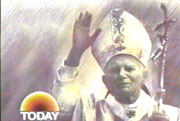 As in last year’s coverage of the death of President Ronald Reagan, the national media offered Pope John Paul II a generous farewell, highlighting his positive role in ending the Cold War, building bridges to other faiths, and inspiring Catholics in his energetic travels. But the positive coverage did not match the usual pattern of papal coverage over the decades of his pontificate. In the typically secular and political approach of the networks, John Paul was portrayed during his life as positive or negative depending on whose political side he landed on. On internal church matters over the years, reporters glorified and enlarged the influence of those who wanted to invent a more convenient church that defines holiness down for its members, not preserve an ancient church and call its members to greater commitment.
As in last year’s coverage of the death of President Ronald Reagan, the national media offered Pope John Paul II a generous farewell, highlighting his positive role in ending the Cold War, building bridges to other faiths, and inspiring Catholics in his energetic travels. But the positive coverage did not match the usual pattern of papal coverage over the decades of his pontificate. In the typically secular and political approach of the networks, John Paul was portrayed during his life as positive or negative depending on whose political side he landed on. On internal church matters over the years, reporters glorified and enlarged the influence of those who wanted to invent a more convenient church that defines holiness down for its members, not preserve an ancient church and call its members to greater commitment.
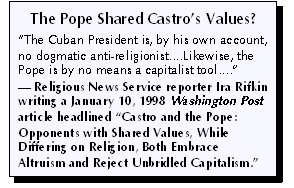 ■ A 1989 meeting between Soviet dictator Mikhail Gorbachev and the Pope gave CBS and ABC an opportunity to take moral equivalence to absurd new heights. During the November 29, 1989 CBS Evening News, Dan Rather declared, “This week’s meeting of Pope John Paul and Gorbachev brings together two traditional enemies, both of whom have shown, time and again, that they can rise above the hatreds of history.” Rather went on to lay the most ridiculous metaphor before a national audience: “The meeting, said one priest in Rome, is like the lion lying down with the lamb. But in this case, he said, it’s hard to tell who’s the lion and who’s the lamb.” (It was almost as odd as
Time essayist Lance Morrow’s intoxicated January 1, 1990 take on Mikhail Gorbachev as the “Communist Pope and the Soviet Martin Luther.”)
■ A 1989 meeting between Soviet dictator Mikhail Gorbachev and the Pope gave CBS and ABC an opportunity to take moral equivalence to absurd new heights. During the November 29, 1989 CBS Evening News, Dan Rather declared, “This week’s meeting of Pope John Paul and Gorbachev brings together two traditional enemies, both of whom have shown, time and again, that they can rise above the hatreds of history.” Rather went on to lay the most ridiculous metaphor before a national audience: “The meeting, said one priest in Rome, is like the lion lying down with the lamb. But in this case, he said, it’s hard to tell who’s the lion and who’s the lamb.” (It was almost as odd as
Time essayist Lance Morrow’s intoxicated January 1, 1990 take on Mikhail Gorbachev as the “Communist Pope and the Soviet Martin Luther.”)
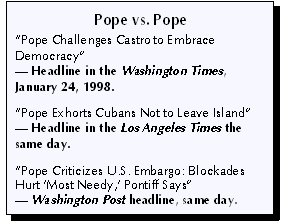 ■ On the June 3 CBS This
Morning, Quint began: “The Pope today attacked one principle communism brought to Poland that most of his fellow countrymen want to keep: separation of church and state.” But the “principle” the Soviets brought was not Jefferson’s separation of church and state, but suppression of the church by the state. Behind the Iron Curtain, Catholic priests and believers were killed and tortured, imprisoned and stifled by the communists, not granted freedom of worship.
■ On the June 3 CBS This
Morning, Quint began: “The Pope today attacked one principle communism brought to Poland that most of his fellow countrymen want to keep: separation of church and state.” But the “principle” the Soviets brought was not Jefferson’s separation of church and state, but suppression of the church by the state. Behind the Iron Curtain, Catholic priests and believers were killed and tortured, imprisoned and stifled by the communists, not granted freedom of worship.
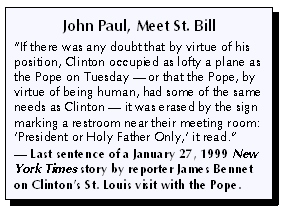 Keller did not explain how Catholics were like Soviet subjects. They do not suffer from forced obedience to their parish priest. They need not fear a trip to the gulag or a quick execution for disagreeing with their Holy Father. They have every liberty to disagree, and every right to walk out of the church, never to return. But for all his bad analogies, Keller was really complaining that the secular liberal media intelligentsia should have the right to “reform” the Catholic Church, to remake an authoritarian God in their own more “compassionate” and “tolerant” image.
Keller did not explain how Catholics were like Soviet subjects. They do not suffer from forced obedience to their parish priest. They need not fear a trip to the gulag or a quick execution for disagreeing with their Holy Father. They have every liberty to disagree, and every right to walk out of the church, never to return. But for all his bad analogies, Keller was really complaining that the secular liberal media intelligentsia should have the right to “reform” the Catholic Church, to remake an authoritarian God in their own more “compassionate” and “tolerant” image.
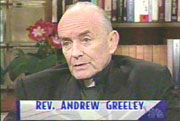 ■ NBC’s appointed papal expert in three morning interviews, liberal Catholic priest and novelist Andrew Greeley, told
Today co-host Giselle Fernandez on October 7: “I heard a Catholic conservative last night say that the Pope’s words have nothing to do with American politics, and I can’t imagine anybody being more totally wrong. The Pope has come to the United States when it’s in a very mean-spirited period, when it’s bashing immigrants, bashing poor people, bashing minorities. And the Pope has come to say ‘Hey, stop that!’ He isn’t talking about specific legislative measures, but he’s certainly addressing himself to the spirit that elected and sustains the Gingrich-Dole Congress.”
■ NBC’s appointed papal expert in three morning interviews, liberal Catholic priest and novelist Andrew Greeley, told
Today co-host Giselle Fernandez on October 7: “I heard a Catholic conservative last night say that the Pope’s words have nothing to do with American politics, and I can’t imagine anybody being more totally wrong. The Pope has come to the United States when it’s in a very mean-spirited period, when it’s bashing immigrants, bashing poor people, bashing minorities. And the Pope has come to say ‘Hey, stop that!’ He isn’t talking about specific legislative measures, but he’s certainly addressing himself to the spirit that elected and sustains the Gingrich-Dole Congress.”
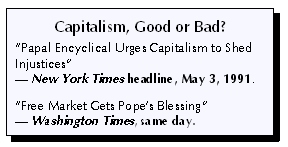 But when asked about Catholic reaction to the Pope’s moral authority on sexual matters, Greeley flip-flopped and found the Pope had nothing to do with America on these issues: “Well, most Catholics choose to be Catholic on their own terms....Where they think the Pope really doesn’t understand, they reserve the right to follow their own consciences and appeal to a God who does understand.”
But when asked about Catholic reaction to the Pope’s moral authority on sexual matters, Greeley flip-flopped and found the Pope had nothing to do with America on these issues: “Well, most Catholics choose to be Catholic on their own terms....Where they think the Pope really doesn’t understand, they reserve the right to follow their own consciences and appeal to a God who does understand.”
